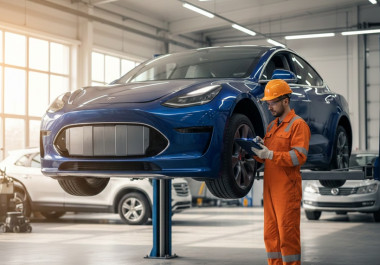Car auctions can feel like walking a tightrope between opportunity and overcommitment. One of the most common challenges bidders face is a bidding war, a situation where multiple bidders push the price sky-high in the heat of competition.
Understanding when a bidding war is in full swing and recognising the right moment to step back is key to winning smartly and avoiding overpaying. This exploration covers strategies for spotting a bidding war, shares insider tips on smart bidding, and offers practical advice on knowing when it's best to withdraw.
The Dynamics of a Bidding War
In a bidding war, the excitement of competition can lead to inflated prices as bidders become emotionally invested and lose sight of their budget limits. Picture an auction room charged with energy, sometimes overwhelming, where the adrenaline rush can prompt exceeding intended price ranges. The goal is to keep strategy clear and emotions in check.
A young business owner once attended his first auction with homework done and a limit set at £8,000 for a Transit van. When another bidder kept countering, something shifted. Pride took over, and the final bid reached £10,500 for a van worth maybe £9,200 on a good day. Upon collection, the realisation hit hard. This scenario illustrates the danger when winning becomes more important than the actual deal.
Why Bidding Wars Happen
Competition triggers something primal. Buyers aren't just purchasing a vehicle anymore. There's an unspoken need to prove being the smartest person in the room. That's flawed thinking, but it happens to the best of bidders.
Market conditions play a role too. When quality stock is scarce, even experienced buyers get twitchy. Budgets stretch because the next decent lot might not come around for weeks.
Recognising the Signs of a Bidding War
Before placing a bid, it's essential to read the room, figuratively speaking. What's the real difference between a healthy auction and a bidding war that'll drain a wallet?
Here are key signs of stepping into dangerous territory:
Rapid Price Increases
One telling sign is the rapid escalation in bid amounts. When prices begin to climb sharply, it often indicates that multiple parties are competing for the same vehicle.
This is a clear cue to evaluate whether the vehicle is worth the surging price or if it's wiser to withdraw. £500 increments can turn into £1,000 jumps within seconds. That's the warning bell.
Emotional Bidding
Bidding wars are fuelled by emotion. When bidders become visibly excited or frustrated, it signals that the environment is heating up.
Staying calm and assessing the situation rather than getting swept up by the excitement is crucial. Watch for bidders who start shifting in their seats or adjusting their glasses repeatedly. These physical tells reveal when someone's abandoned their strategy.
Multiple Bidders in the Ring
Keep an eye on how many people are actively participating. If several experienced bidders are aggressively competing, it might be best to reconsider the strategy.
Stepping back from a highly competitive lot can save money. Three or more active bidders? That's when prices typically exceed reasonable market value.
Overenthusiastic Bids
When bids start to exceed what the vehicle's market value would suggest, it's a red flag. Overenthusiastic bidding often pushes prices beyond the vehicle's true worth, signalling that emotions are overtaking logic.
Always compare the current bid with the actual value. If a vehicle's trade value is £7,000 and bidding is already at £8,500 with no signs of slowing, that's bidding war territory.
Limited Time and High Stakes
Bidding wars tend to intensify when there's a lot on the line, such as a limited number of high demand vehicles. In these situations, the fear of missing out can drive prices up.
Recognise these moments and decide in advance how to respond to avoid overcommitment. End of day lots often see reduced competition as buyers tire out, sometimes patience pays better than participation.
When to Walk Away: Knowing the Limits
The art of bidding lies not only in spotting a bidding war but also in knowing when to withdraw. Smart buyers win by knowing when to lose.
Here are some tips for deciding when it's time to step back:
Set a Clear Budget
Before entering the auction, determine the maximum price for each vehicle. Base this budget on the vehicle's market value, business needs, and a comfortable negotiation margin.
Once set, adhere to this limit regardless of the surrounding bidding frenzy. Write it down if necessary. Keeping a small card with maximum figures has saved countless bidders thousands over the years.
Evaluate the True Value
Do the homework by researching the vehicle's history, condition, and market trends. If the auction price begins to exceed the vehicle's true value, it's a strong indicator that the bidding war is inflating the price excessively.
Use vehicle history reports and condition assessments to make informed decisions. Check sold prices on similar vehicles from the past month. That's the reality check, not the auctioneer's enthusiasm.
For a comprehensive selection of lots, explore our car auctions, motorcycle auctions, and van auctions.
Emotional Detachment
Maintain an objective stance throughout the auction. If emotions begin getting attached to winning the bid, take a step back and reassess.
Remember, a bidding war is often about the excitement of the moment rather than the actual value. A brief pause or deep breath can help regain clarity. Walking away from auctions, grabbing a coffee, and realising a costly mistake was nearly made happens more often than most admit.
Consider the Competition
Sometimes, observing competitors can provide insight into whether a bidding war will conclude favourably. Aggressive bidding by experienced participants may indicate that the vehicle's value is being artificially inflated.
In such cases, it might be wiser to withdraw and wait for a more balanced auction. If the same three dealers are battling over every lot, they might know something others don't, or they might just be having a testosterone contest.
Trust Instincts
After all the analysis, sometimes intuition is the best guide. If something feels off, even if the reason can't be pinpointed immediately, trust those instincts.
A heated bidding war might lead to an impulsive decision that could be regretted later. The subconscious picks up details the conscious mind misses. Don't ignore that nagging feeling.
Practical Strategies to Avoid Overpaying
Even when deciding not to participate in a bidding war, several strategies can help ensure securing the best deal:
Do the Research
Knowledge is a powerful tool. Familiarise with market prices, vehicle conditions, and recent auction trends.
Staying informed helps bid confidently and avoid unnecessary competition. Spend an hour researching before spending thousands bidding. Check completed auctions on RAW2K to see what similar vehicles actually sold for, not just what they were listed at.
Attend Auctions as an Observer
For those new to the auction scene, consider attending a few auctions without placing bids. This experience allows observing the bidding dynamics and learning when to engage and when to hold back.
Patterns will emerge, certain bidders who always overpay, specific vehicle types that consistently exceed value, times of day when competition drops. That education is priceless.
Use Proxy Bidding
Some platforms offer proxy bidding systems where the maximum bid can be set in advance. This method helps avoid the pressure of a bidding war by allowing the system to bid automatically.
Bidding happens without the influence of real time emotion. It's like having a level headed assistant do the bidding from a distance. The system stops when the limit's reached, no exceptions, no excuses.
Develop a Bidding Plan
Establish a clear strategy before the auction begins. Decide whether to start with a low bid and gradually increase or to wait until the final moments to place the bid.
A well structured plan helps stay focused and disciplined. Some buyers prefer jumping in early to establish dominance. Others wait until the last second to avoid triggering competitive instincts in other bidders. Neither approach is wrong, just pick one and stick with it.
Learn from Past Experiences
Every auction is a learning opportunity. Reflect on previous bidding experiences to understand which strategies worked and which didn't.
Recognising moments when excitement led to overspending can help refine the approach. Keep a simple log, vehicle type, maximum price, final price, outcome. Patterns emerge quickly, and instincts develop that save money.
The Role of Technology in Modern Car Auctions
Technology has transformed car auctions, making it easier to manage bidding wars and make informed decisions.
Real Time Data and Analytics
Modern auction platforms offer real time data and analytics on bidding trends. This information can provide valuable insight into the pace and intensity of a bidding war.
It helps decide whether to engage or withdraw. See how quickly prices are climbing, how many active bidders are participating, and whether the current price aligns with recent sales data.
Digital Alerts and Notifications
Digital alerts notify when bidding on a particular vehicle reaches a specific threshold. This feature helps monitor activity without constant supervision.
Being ready when the moment arrives becomes easier. Set alerts £500 below the maximum, that gives time to make a final decision rather than reacting in panic.
Online Auction Platforms and Regional Options
Online platforms have expanded the reach of auctions, making participation convenient regardless of location. Bidding can happen from the office, home, or even mobile whilst travelling.
For regional selections, browse vehicles across diverse areas. These options ensure a wide range of opportunities to engage in auctions strategically. If one region's prices are inflated, easily pivot to another market where competition's less intense.
Check out today's auctions to see what's currently available.
Understanding Auction Psychology
Here's something most guides won't tell you: bidding wars are psychological warfare. Auctioneers know this. Experienced bidders know this. Every participant should understand it too.
The Anchoring Effect
The opening bid sets a mental anchor. If an auctioneer starts low, it feels like getting a deal even when the price climbs beyond value. If they start high, everything below that feels reasonable.
Don't let the starting point dictate perception of value. Research determines value, not the auctioneer's opening gambit.
The Scarcity Principle
"Last one today, folks!" That phrase has cost buyers millions collectively. Scarcity creates urgency, and urgency kills rational thinking.
There's always another auction. Another vehicle. Another opportunity. When convincing oneself otherwise, the battle's already lost.
Social Proof and Validation
When multiple bidders chase the same vehicle, there's an assumption they know something others don't. Maybe they do. More often, they're caught in the same emotional trap.
Bidders have paid £2,000 over market value because five other people wanted it. Then discovered those five people were all new to auctions and equally clueless. Don't follow the crowd blindly.
Red Flags That Scream "Walk Away"
Some situations practically beg for withdrawal. Learn to recognise them:
Bid Increments Start Shrinking
When increments drop from £500 to £100 or even £50, bidders are squeezing every last pound from their budgets. Ceiling prices are approaching. That's when smart money exits.
Justifying the Price
If mental calculations focus on how to afford it rather than whether it's a good deal, stop. The line from strategic buying to emotional spending has been crossed.
The Auctioneer Is Working Directly
Experienced auctioneers can read a room. If they're making direct eye contact, using names, or directing comments specifically, they've identified emotional investment. That's not flattery, it's technique.
Heart Rate Increases
Physical symptoms don't lie. Sweaty palms? Racing pulse? Tunnel vision? The body's warning that thinking isn't clear. Listen to it.
Building a Long Term Auction Strategy
Success at auctions isn't about winning individual battles. It's about winning the war, consistently securing quality vehicles at prices that make business sense.
Diversify the Approach
Don't put all hopes on one lot. Identify three to five potential vehicles per auction. If outbid on the top choice, alternatives are ready. This removes desperation from bidding.
Explore truck auctions, motorhome auctions, or featured auctions to expand options.
Build Relationships
Get to know the auctioneers and regular attendees. Not to collude, that's unethical and often illegal, but to understand market dynamics better. Experienced buyers can offer insights. Auctioneers can clarify condition reports.
These relationships provide context that helps bid more effectively. Learn which buyers always overpay, which vehicles consistently underperform, and where the genuine value lies.
Track Performance
Keep records of every auction attended. Note which vehicles were bid on, maximum price, final selling price, and whether won or lost. Include brief notes about why each decision was made.
After six months, patterns become obvious. See where consistent overbidding occurs, which vehicle types offer the best value, and when walking away should've happened but didn't.
Set Weekly or Monthly Limits
Beyond individual vehicle budgets, establish broader spending limits. This prevents the "just one more" mentality that can drain resources across multiple auctions.
If the monthly acquisition budget is £50,000, stick to it. Doesn't matter if twelve amazing deals appear, financial discipline trumps opportunity every time.
Case Study: When Walking Away Was the Right Call
Consider a scenario. An experienced buyer attended an auction eyeing a low mileage Mercedes Sprinter. Research suggested a fair price around £14,000.
Bidding opened at £10,000. Promising start. Within minutes, three bidders pushed it to £13,000. The buyer stayed calm, bid £13,500. Another bidder countered at £14,000.
The limit had been reached. But then something was noticed, the other remaining bidder kept glancing at a phone between bids. Mobile bidders often have less information or are bidding emotionally from a distance. Tempting to stay in, right?
Walking away happened. The other bidder won at £16,200. Two days later, that same bidder listed the Sprinter privately for £15,500, taking a loss once it was actually inspected properly. The vehicle had undisclosed rear end damage that reduced its value significantly.
The experienced buyer found a comparable Sprinter three weeks later at a quieter auction. Paid £13,800. No hidden damage. That's the power of patience and knowing when to withdraw.
What to Do After Walking Away
Walking away doesn't mean giving up. It means regrouping and approaching the next opportunity smarter.
Review What Happened
Analyse the bidding war just avoided. What drove prices up? Were there warning signs missed initially? How accurate was the research? This reflection sharpens instincts for next time.
Adjust the Strategy
If consistently getting outbid, the wrong vehicles or auctions might be targeted. Perhaps attending different times, focusing on different vehicle categories, or adjusting budget expectations is needed.
Check Monday's auctions, Tuesday's auctions, or other specific days to find less competitive opportunities.
Stay Emotionally Neutral
Don't beat yourself up for not winning. Every pound saved on an overpriced vehicle is a pound available for a properly priced one. The goal isn't accumulating vehicles, it's accumulating value.
Plan the Next Move
Identify upcoming auctions with similar vehicles. Set alerts for specific makes or models. Refine research based on what was learned. Each auction experience, win or lose, makes a better buyer.
Common Mistakes Even Experienced Bidders Make
Nobody's immune to auction psychology. Here are traps that catch even seasoned professionals:
The Sunk Cost Fallacy
Already bid £8,000. Walking away feels like wasting the time and effort invested. But that's rubbish logic. Previous bids don't obligate continuation. Each new bid is a separate decision based on current value, not past investment.
Overconfidence from Past Wins
Three successful auctions in a row can create feelings of invincibility. Trusting gut over research starts happening. That's when expensive mistakes occur. Every auction requires the same rigorous preparation, regardless of recent track record.
Underestimating Repair Costs
Justifying a higher bid by thinking repair will be cheap happens often. Unless doing the work personally and having accurate parts costs, underestimation is probable. Factor in realistic repair expenses before setting the maximum bid.
Ignoring Total Acquisition Costs
The hammer price isn't the total cost. Buyer's premiums, transport, immediate repairs, and administrative fees add up. A vehicle that seems like a bargain at £10,000 might actually cost £11,500 by the time it's ready for use. Calculate total costs before bidding.
The Psychology of Winning by Losing
Here's a truth that takes years to fully appreciate: the best auction wins are sometimes the ones where no participation happens. Sounds backwards, doesn't it?
But consider this, every pound not overspent is profit. Every overpriced vehicle avoided is a disaster prevented. The goal isn't winning auctions; it's building a profitable, sustainable business or collection.
Buyers who "won" dozens of auctions and went bust within two years exist because they never met a bid they could walk away from. Others who attend twenty auctions before buying their first vehicle still thrive decades later.
Which outcome sounds better?
When the Bidding War Actually Makes Sense
Occasionally, rarely, but occasionally, staying in a bidding war is the right call. How to know when?
Genuinely Unique Vehicles
If bidding on something truly rare that won't come around again soon, market value becomes more flexible. A limited edition model, an historically significant vehicle, or something with provenance might justify exceeding typical price ranges.
But be honest. Is it genuinely rare, or is that just justification for the expense?
Strategic Business Needs
Perhaps a specific vehicle is needed to fulfil a contract or complete a collection. If walking away costs more than overpaying slightly, then staying in makes business sense.
Calculate the opportunity cost of not acquiring the vehicle versus the premium to be paid. Sometimes a 10% overpayment today prevents a 20% loss tomorrow.
Exceptional Research Has Been Done
If the vehicle has been inspected thoroughly, history confirmed, condition verified, and research absolutely supports a higher value than current bidding suggests, information other bidders lack might exist.
This is rare. But when it happens, confidently exceeding what others perceive as market value becomes possible because superior information is available.
Building an Auction Toolkit
Successful auction participation requires more than just good intentions. Here's what's needed:
Research Resources
Subscribe to vehicle valuation services. Bookmark auction result databases. Follow market trends through industry publications. Knowledge is the first line of defence against overpaying.
Financial Discipline Tools
Use apps or spreadsheets to track budgets, spending, and results. Set alerts when approaching limits. Remove the possibility of "accidentally" exceeding budget through poor tracking.
Inspection Checklists
Develop standardised checklists for evaluating vehicles before bidding. This ensures critical factors aren't overlooked in the excitement of auction day. Mechanical condition, service history, cosmetic issues, document everything systematically.
Emotional Circuit Breakers
Identify personal triggers. Does competition create overreaction? Do certain vehicle types cloud judgment? Build in circuit breakers, predetermined rules that force pausing and reassessing when triggered.
A simple rule example: if the maximum bid gets exceeded, wait for three more bids before deciding whether to continue. That forced pause has saved countless bidders significant amounts.
The Auction Community and Learning from Others
One often overlooked resource is the auction community itself. Regular attendees accumulate tremendous knowledge about vehicle values, condition assessment, and bidding strategies.
Strike up conversations during preview periods. Ask questions (without revealing specific interests). Share observations. Most experienced buyers are surprisingly generous with advice when approached respectfully.
Learn which auction houses consistently deliver quality vehicles, which have excellent descriptions, and which tend to attract more emotional (read: overpaying) bidders. This intelligence refines strategy over time.
Join online forums or social media groups focused on vehicle auctions. The collective wisdom of experienced buyers can help avoid expensive mistakes and identify opportunities that might've been missed.
Wrapping Up: An Auction Success Framework
Bidding wars can be both exciting and challenging. Success lies in knowing when to engage and when to withdraw.
By setting clear budgets, understanding market values, leveraging technology, and maintaining emotional discipline, navigating the complexities of bidding wars confidently becomes possible. Remember, it's not about winning every auction, it's about winning the right auctions at the right prices.
Every auction offers a learning opportunity. The aim is developing a strategy that protects investments and helps secure the best deals.
Consider registering with us to access our full range of auctions and tools. If personalised advice or questions about specific auctions are needed, get in touch with our team.
Embrace the challenges of the auction floor with a clear mind, a well prepared strategy, and the confidence that comes from knowing limits. The vehicles will keep coming. The auctions will keep running. The job is to be ready when the right opportunity appears, and wise enough to recognise when it doesn't.
Happy bidding, and remember: sometimes the best bid is no bid at all.




